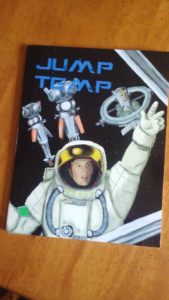I’ve been following around the OSR (Old School Renaissance or Revival depending on who you ask) community for a little bit now. At first, the movement in the RPG community seems like a rejection of anything modern and it is to some extent. It’s easy to be against things, what’s more interesting to me is what the OSR works toward. That’s why I liked Matt Finch’s booklet “A Quick Primer for Old School Gaming” it summarizes some reasons why people enjoy an OSR title in what he calls Four Zen Moments. He then explains four Taos for the Game Master.
Some of these Zen moments I like some I don’t, some I think are better achieved through different means. I’d like to approach them here and attempt to discuss them objectively from a design perspective.
Zen Moment 1: Rulings not Rules
I’m not going to rehash the whole text that Mr. Finch wrote, the booklet is free. Briefly though, the idea here is that the referee (or GM) uses the rules and the players use descriptions to interact with the referee. The referee is like a judge that must rule based only on a constitution and the arguments that are presented and possibly a few tests (that’s how it sounded to me anyway).
Observations
- Players are totally at the mercy of the ref. A good ref can run an enjoyable game, a poor ref is maddening.
- The mental load on the ref is shifted from memorization to making spot judgements. This is good if your ref is very imaginative and has a poor memory.
- The mental load on the players is moved from memorization to imagining the environment they’re in. This benefits people with good spacial memory but hurts those who have trouble imagining a three dimensional space.
- This approach is highly dependent on good communication skills in both directions. I think we’ll all agree that it’s always nice to have a good communicator but we don’t always get one.
- When philosophies clash, the player will lose.
- Players have no “legal” legs to stand on. When there is a rule, a player can point to it and show why they should be allowed to do something a ref says no to.[1]
- I have personally seen a ref follow the example that Mr. Finch gives for the “Ninja Jump” in a modern game so he’s not wrong.
Zen Moment 2: Player Skill, not Character Abilities
This one seems a little less focused to me but I understand the grouping. The main idea is that you are your character’s mind. You’re able to do whatever you could with common knowledge in that situation. Usually that doesn’t include knowledge that would be situationally inappropriate like how to build an airplane in a medieval fantasy. However, if the player is clever with their use of knowledge, it’s ok for them to do things that would seem inappropriate for their character, like a big dumb barbarian that keeps coming up with brilliant plans.
It also includes the idea that the game doesn’t revolve around the PC’s stats. There are monsters that the players just can’t take on and it’s their job to be able to tell that.
This Zen moment is the most revealing that OSR is a specific flavor of RPG. Mr. Finch explains that OSR games are about taking an average person and building them into a hero.
Observations
- Players that are good at something will always be good at that in game.
- Players that are bad at something cannot effectively play characters that should be good at it.[2]
- This type of play is better looked at through the lens that the character is inexperienced at first and as the player learns how the world works, the character is also. A game that uses more character abilities assumes the character has knowledge that they are bringing to the situation.[3]
- Inexperience can be deadly.[4]
- Clues that should be obvious and relevant might be missed because the ref didn’t offer and players didn’t ask for it.
Zen Moment 3: Heroic, not Superhero
I’m not sure where the Zen moment is here. This point is just framing the scope of the game. Players start out as average people and you try and build them into heroes. They never become untouchable or immortal, it’s just not in the scope of the game. Maybe the Zen is that this can be enjoyable?
Again, this is pointing to the OSR being a specific flavor of RPG. If you like that scale of progression, then you might like an OSR game. If you’re looking for something different, OSR might let you down.
Observations
- Obviously superhero games might not fit well with OSR concepts but it could be done for low level superpowers.[5]
- Spy games don’t really jibe with this moment.
- One kind of experience (zero to hero) might not be what players want.[6]
Zen Moment 4: Forget Game Balance
This was partly covered in moment 2 but is elaborated on. The game doesn’t care what the character’s level or stats are, it’s the player’s job to figure out what they can and can’t fight through.
Mr. Finch also emphasizes moment 1 here, that the players have no right to depend on a rule book[1]. It may have been better to call this moment “You don’t have the right” because that’s what is repeated. It’s brought out that a ref never has the right to tell a player what their character does. More accurately, the ref can never make a choice for the player. In earlier examples given, the ref is repeatedly telling the players what their character does as a result of their choice and rolls.
Observations
- Inexperience is deadly.[4]
- Taken too far, the ref could build an adventure that is simply impossible for the PCs. This has to be tempered with the ref working to make an enjoyable game. The general difficulty of the game still needs to be controlled.[7]
Tao 1: The Way of the Ming Vase
Basically, find ways to have secondary effects happen in the game. Be imaginative with the player’s choices having consequences. Critical successes and critical failures are intrinsic to these consequences.
Observations
- This is probably good advice for any RPG, although the mechanism for unintended consequences and secondary effects isn’t always explicitly stated.[8]
- This is going to be difficult for a starting ref to always have novel unintended consequences. I’ve been GMing for twenty five years and it’d be hard to do this perfectly.
Tao 2: The Way of the Moose Head
This is a way of handling exploration that relies on the characters asking the right questions and knowing what to do with the answers.[9]
Observations
- This is a matter of preference more than solid gaming advice.
- Tired players are going to have a hard time asking the right questions.
- Players are going to miss out on a lot of details that you’ve prepared.[4]
Tao 3: Your Abstract Combat-Fu Must be Strong
This is the idea that it’s the GM’s job to fill in the results of combat creatively or quickly.
Observations
- This Tao’s description relies heavily on critical successes and failures for permission to be creative.
- This really should be part of any RPG, I know it’s not always but that’s just people getting lazy.
- This is putting all the load of creativity load on the GM.
- This could be a source of contention with the players since the GM is dictating what their character does as a result of their choice.[8]
Tao 4: Way of the Donner Party
This Tao is about resource management. The most useful part of this advice is that the GM should keep a tight grip on how much time has passed in order to handle depleting resources. The big takeaway is that OSR games are heavy in resource management[4] take a step back and own that and you’ll get the results the designers intended.
Observations
- I’ll say it again, lose track of time and you lose track of resource use when doing it this way.
- A lot of players actively try and game resource and time management (cheat), this puts a heavier load on the GM.
- There are some tools that handle resource management without having to mentally track all the elements that could cause a party to be in trouble.
- This is good practice in a lot of RPGs, not a lot of people do it though or even want to which says something.
- Time management might get squishy when the characters are wandering around poking 10 ft poles at things. No rules no structure.[8]
In the end, OSR games are a type or RPG, they’re not my thing judging from the descriptions given. “Modern” games are often designed to avoid problems that players of old school games had at their tables. I don’t think playing an OSR game would result in table flipping in my current group but it would have when I was a teen.
I was hoping to find some essential core truths about RPGs or why the OSR has such a strong following. I don’t think I see a lot of universal tools here other than “be creative and tell a story” which is mostly the Story Games crowd’s thing. Certainly the OSR group gets there differently. I’ve always played without worrying about game balance. Story Games would have a hard time inducing that kind of experience so there’s lessons to be learned for sure. Neither group have a monopoly on RPG insights.
If anything, seeing that large numbers of people like this kind of experience confuses me. Either there are a lot of really good GMs out there, people are masochistic or they prefer GM control because it’s easer for them. RPGs largely rejected all controlling GMs in the 80’s and keep moving away from them. Then the OSR shows up and goes right back to it. Is the OSR made possible by the older, wiser, more experienced GMs out there? Is it possibly driven by them, their desire to play games like they did when they were young? Is it simple nostalgia? I know all the OSR adherents are screaming at your computers right now.
Games have to talk to your experience in life for them to be really enjoyed. In some ways I’ve experienced the ideas described and in others I’ve experienced the opposite making them difficult to try and enjoy. GM control can simplify play fun can turn into a game of Mother May I. It strongly depends on the GM, their experience level and even their mood. Thats why a lot here is mercurial. It can be good or it can get really bad.
There are some good concepts to be explored here though. I think they have their upsides and downsides. A lot of the ideas put a heavy load on the GM which could lead to burn out if a GM isn’t careful. Each trade off may be better or worse for specific players. Some will find the methods here liberating. Others will find them frustrating and limiting.
Continue reading “OSR?”

